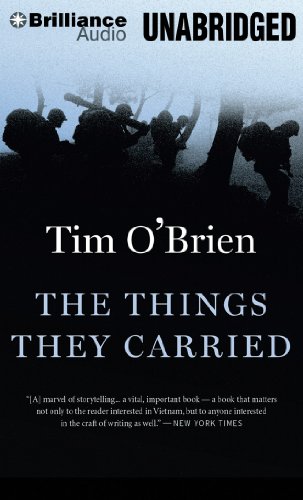
This modern classic and New York Times bestseller was a finalist for both the 1990 Pulitzer Prize and National Book Critics Circle Award and has become a staple of American classrooms. Hailed by The New York Times as “a marvel of storytelling”, The Things They Carried’s portrayal of the boots-on-the-ground experience of soldiers in the Vietnam War is a landmark in war writing. Now, three-time Emmy Award winner Bryan Cranston, star of the hit TV series Breaking Bad, delivers an electrifying performance that walks the book’s hallucinatory line between reality and fiction and highlights the emotional power of the spoken word. The soldiers in this collection of stories carried M-16 rifles, M-60 machine guns, and M-79 grenade launchers. They carried plastic explosives, hand grenades, flak jackets, and landmines. But they also carried letters from home, illustrated Bibles, and pictures of their loved ones. Some of them carried extra food or comic books or drugs. Every man carried what he needed to survive, and those who did carried their shattering stories away from the jungle and back to a nation that would never understand. This audiobook also includes an exclusive recording “The Vietnam in Me,” a recount of the author’s trip back to Vietnam in 1994, revisiting his experience there as a soldier 25 years before, read by Tim O’Brien himself. The Things They Carried was produced by Audible Studios in partnership with Playtone, the production company headed by Tom Hanks and Gary Goetzman, and the creator of the award-winning mini-series Band of Brothers, John Adams, and The Pacific.”They carried all the emotional baggage of men who might die. Grief, terror, love, longing–these were intangibles, but the intangibles had their own mass and specific gravity, they had tangible weight. They carried shameful memories. They carried the common secret of cowardice…. Men killed, and died, because they were embarrassed not to.”
A finalist for both the 1990 Pulitzer Prize and the National Book Critics Circle Award, The Things They Carried marks a subtle but definitive line of demarcation between Tim O’Brien’s earlier works about Vietnam, the memoir If I Die in a Combat Zone and the fictional Going After Cacciato, and this sly, almost hallucinatory book that is neither memoir nor novel nor collection of short stories but rather an artful combination of all three. Vietnam is still O’Brien’s theme, but in this book he seems less interested in the war itself than in the myriad different perspectives from which he depicts it. Whereas Going After Cacciato played with reality, The Things They Carried plays with truth. The narrator of most of these stories is “Tim”; yet O’Brien freely admits that many of the events he chronicles in this collection never really happened. He never killed a man as “Tim” does in “The Man I Killed,” and unlike Tim in “Ambush,” he has no daughter named Kathleen. But just because a thing never happened doesn’t make it any less true. In “On the Rainy River,” the character Tim O’Brien responds to his draft notice by driving north, to the Canadian border where he spends six days in a deserted lodge in the company of an old man named Elroy while he wrestles with the choice between dodging the draft or going to war. The real Tim O’Brien never drove north, never found himself in a fishing boat 20 yards off the Canadian shore with a decision to make. The real Tim O’Brien quietly boarded the bus to Sioux Falls and was inducted into the United States Army. But the truth of “On the Rainy River” lies not in facts but in the genuineness of the experience it depicts: both Tims went to a war they didn’t believe in; both considered themselves cowards for doing so. Every story in The Things They Carried speaks another truth that Tim O’Brien learned in Vietnam; it is this blurred line between truth and reality, fact and fiction, that makes his book unforgettable. –Alix Wilber

A Vietnam Primer for a 1969 baby… I was born in 1969. I missed Vietnam. The war was over and I never knew about it. For an event that had such significance in American history, it was as though it had never happened.When I was in High School and we studied American History, our class always ended with WWII. We never discussed “modern” events — the 60s, the Vietnam War, the Civil Rights movement.When I got to college, I made a point of taking a class on the 60s. Still though, I gained a textbook…
A Masterpiece I was first introduced to this book as part of a U.S. & Vietnam History course in college. The other novel the course required was The Quiet American by Graham Greene. Tim O’Brien’s book is every bit as good as Greene’s, and all the more timely.As a former soldier, and a veteran of Desert Storm, whose father avoided the draft during the Vietnam War, the book taught me that no matter what other people say about the war, no matter what I learn, I can never make any value judgements on…
“. . . stories can save us” Tim O’Brien’s “The Things They Carried” is a book that transcends the genre of war fiction. Actually, it transcends the genre of fiction in general. Although labeled “a work of fiction” on the title page, the book really combines aspects of memoir, novel, and short story collection. I think you could use Audre Lorde’s term “biomythography” to describe this book.The first-person narrator of this book (named, like the author, Tim O’Brien) is a writer and combat…